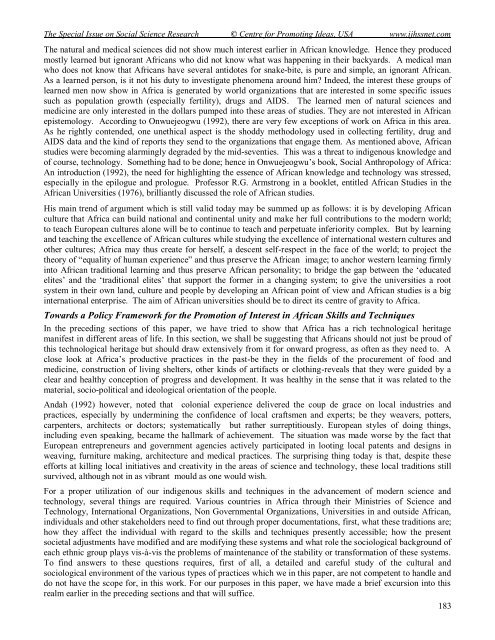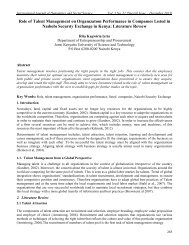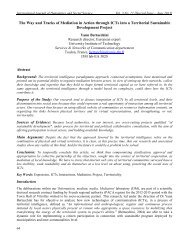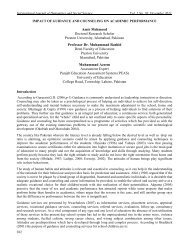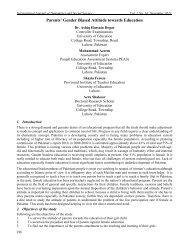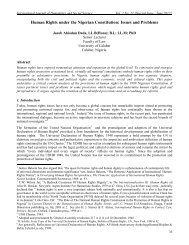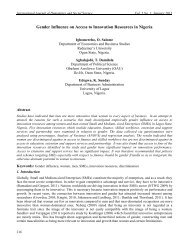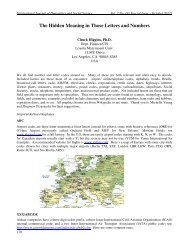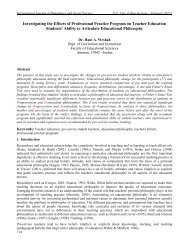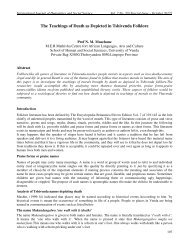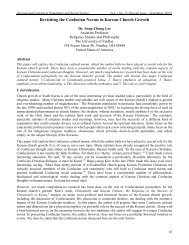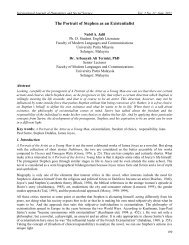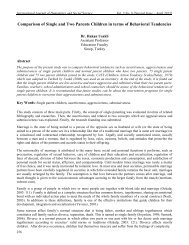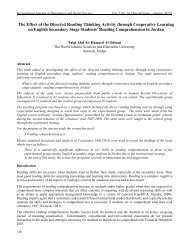THE ROLE OF TRADITIONAL SKILLS AND TECHNIQUES IN THE ...
THE ROLE OF TRADITIONAL SKILLS AND TECHNIQUES IN THE ...
THE ROLE OF TRADITIONAL SKILLS AND TECHNIQUES IN THE ...
You also want an ePaper? Increase the reach of your titles
YUMPU automatically turns print PDFs into web optimized ePapers that Google loves.
The Special Issue on Social Science Research © Centre for Promoting Ideas, USA www.ijhssnet.com<br />
The natural and medical sciences did not show much interest earlier in African knowledge. Hence they produced<br />
mostly learned but ignorant Africans who did not know what was happening in their backyards. A medical man<br />
who does not know that Africans have several antidotes for snake-bite, is pure and simple, an ignorant African.<br />
As a learned person, is it not his duty to investigate phenomena around him? Indeed, the interest these groups of<br />
learned men now show in Africa is generated by world organizations that are interested in some specific issues<br />
such as population growth (especially fertility), drugs and AIDS. The learned men of natural sciences and<br />
medicine are only interested in the dollars pumped into these areas of studies. They are not interested in African<br />
epistemology. According to Onwuejeogwu (1992), there are very few exceptions of work on Africa in this area.<br />
As he rightly contended, one unethical aspect is the shoddy methodology used in collecting fertility, drug and<br />
AIDS data and the kind of reports they send to the organizations that engage them. As mentioned above, African<br />
studies were becoming alarmingly degraded by the mid-seventies. This was a threat to indigenous knowledge and<br />
of course, technology. Something had to be done; hence in Onwuejeogwu‟s book, Social Anthropology of Africa:<br />
An introduction (1992), the need for highlighting the essence of African knowledge and technology was stressed,<br />
especially in the epilogue and prologue. Professor R.G. Armstrong in a booklet, entitled African Studies in the<br />
African Universities (1976), brilliantly discussed the role of African studies.<br />
His main trend of argument which is still valid today may be summed up as follows: it is by developing African<br />
culture that Africa can build national and continental unity and make her full contributions to the modern world;<br />
to teach European cultures alone will be to continue to teach and perpetuate inferiority complex. But by learning<br />
and teaching the excellence of African cultures while studying the excellence of international western cultures and<br />
other cultures; Africa may thus create for herself, a descent self-respect in the face of the world; to project the<br />
theory of “equality of human experience” and thus preserve the African image; to anchor western learning firmly<br />
into African traditional learning and thus preserve African personality; to bridge the gap between the „educated<br />
elites‟ and the „traditional elites‟ that support the former in a changing system; to give the universities a root<br />
system in their own land, culture and people by developing an African point of view and African studies is a big<br />
international enterprise. The aim of African universities should be to direct its centre of gravity to Africa.<br />
Towards a Policy Framework for the Promotion of Interest in African Skills and Techniques<br />
In the preceding sections of this paper, we have tried to show that Africa has a rich technological heritage<br />
manifest in different areas of life. In this section, we shall be suggesting that Africans should not just be proud of<br />
this technological heritage but should draw extensively from it for onward progress, as often as they need to. A<br />
close look at Africa‟s productive practices in the past-be they in the fields of the procurement of food and<br />
medicine, construction of living shelters, other kinds of artifacts or clothing-reveals that they were guided by a<br />
clear and healthy conception of progress and development. It was healthy in the sense that it was related to the<br />
material, socio-political and ideological orientation of the people.<br />
Andah (1992) however, noted that colonial experience delivered the coup de grace on local industries and<br />
practices, especially by undermining the confidence of local craftsmen and experts; be they weavers, potters,<br />
carpenters, architects or doctors; systematically but rather surreptitiously. European styles of doing things,<br />
including even speaking, became the hallmark of achievement. The situation was made worse by the fact that<br />
European entrepreneurs and government agencies actively participated in looting local patents and designs in<br />
weaving, furniture making, architecture and medical practices. The surprising thing today is that, despite these<br />
efforts at killing local initiatives and creativity in the areas of science and technology, these local traditions still<br />
survived, although not in as vibrant mould as one would wish.<br />
For a proper utilization of our indigenous skills and techniques in the advancement of modern science and<br />
technology, several things are required. Various countries in Africa through their Ministries of Science and<br />
Technology, International Organizations, Non Governmental Organizations, Universities in and outside African,<br />
individuals and other stakeholders need to find out through proper documentations, first, what these traditions are;<br />
how they affect the individual with regard to the skills and techniques presently accessible; how the present<br />
societal adjustments have modified and are modifying these systems and what role the sociological background of<br />
each ethnic group plays vis-à-vis the problems of maintenance of the stability or transformation of these systems.<br />
To find answers to these questions requires, first of all, a detailed and careful study of the cultural and<br />
sociological environment of the various types of practices which we in this paper, are not competent to handle and<br />
do not have the scope for, in this work. For our purposes in this paper, we have made a brief excursion into this<br />
realm earlier in the preceding sections and that will suffice.<br />
183


